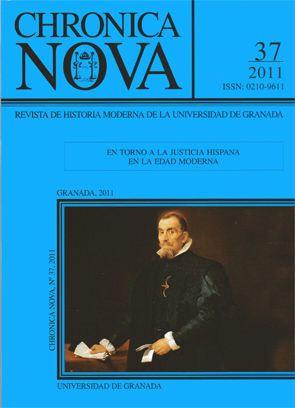Embassies, Court and the intelligence system. England and the Spanish Foreign Policy at the beginning of the Seventeenth Century
DOI:
https://doi.org/10.30827/cn.v0i37.1610Keywords:
Embassies, Spanish Monarch, England, diplomacy, international relations, Agents, XVII CenturyAbstract
The polítical and religious troubles, on the one side, and the anglo-spanish economic conflicts, on the other side, were increasing as from 1570 while the privateering effects in America rose. The Dutch Revolt from 1568 and the expansion of the Spanish Monarchy with the Portugal annexation in 1580 convinced Philip II that the road to war with England was open and inevitable. The Nonsuch Declaration from Elisabeth I, in 1585, was directed to prevent any sort of Spanish intervention at the English Court, interested in all kind of conspirations to knock down the English Crown and to help the rebels in ireland. From that moment, informations spread around the embassies in both countries, the clientelar links and the intelligence system organized in Spain and England were essential to take any political decission at the beginnig of the Seventeenth Century. With the changes at the government, after the Philip II and Elisabeth I deaths, the roads to political stability were ratified by the London Treaty in 1604. Despite of ideological and religious differences, the anglospanish relationships will keep the status quo in the Chanel of la Mancha, the North Sea and the Atlantic mercantile routes up to the middle of the Seventeenth Century.
Downloads
Downloads
Published
How to Cite
Issue
Section
License
Nuestra revista se atiene a las recomendaciones para la implementación del Artículo 37 Difusión en Acceso Abierto de la Ley de la Ciencia, la Tecnología y la Innovación:
- Los/as autores/as cuyas contribuciones sean aceptadas para su publicación en esta revista conservarán el derecho no exclusivo de utilizar sus contribuciones con fines académicos, de investigación y educativos, incluyendo el auto-archivo o depósito de los artículos aceptados en repositorios institucionales o temáticos de acceso abierto de cualquier tipo en un plazo máximo de seis meses.
- Preferiblemente se permitirá el uso de la versión publicada de las contribuciones científicas, que estarán accesibles en abierto tan pronto como sea posible.
-
Que en caso de que el trabajo sea aprobado para su publicación, el/la autor/a autoriza de manera ilimitada en el tiempo a la entidad editora para que incluya dicho texto en Chronica Nova y pueda reproducirlo, editarlo, distribuirlo, exhibirlo y comunicarlo en el país y en el extranjero por medios impresos, electrónicos, CD, Internet o cualquier otro medio conocido o por conocer.






 ISSN-e: 2445-1908
ISSN-e: 2445-1908










